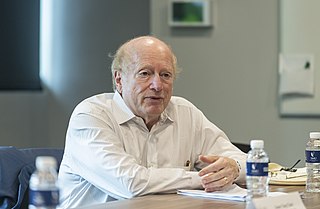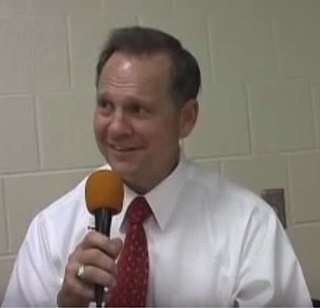Related Research Articles
Romer v. Evans, 517 U.S. 620 (1996), is a landmark United States Supreme Court case dealing with sexual orientation and state laws. It was the first Supreme Court case to address gay rights since Bowers v. Hardwick (1986), when the Court had held that laws criminalizing sodomy were constitutional.
Lawrence v. Texas, 539 U.S. 558 (2003), was a landmark decision of the U.S. Supreme Court in which the Court ruled that sanctions of criminal punishment for those who commit sodomy are unconstitutional. The Court reaffirmed the concept of a "right to privacy" that earlier cases, such as Roe v. Wade, had found the U.S. Constitution provides, even though it is not explicitly enumerated. The Court based its ruling on the notions of personal autonomy to define one's own relationships and of American traditions of non-interference with private sexual decisions between consenting adults.
Bowers v. Hardwick, 478 U.S. 186 (1986), was a landmark decision of the US Supreme Court that upheld, in a 5–4 ruling, the constitutionality of a Georgia sodomy law criminalizing oral and anal sex in private between consenting adults, in this case with respect to homosexual sodomy, though the law did not differentiate between homosexual sodomy and heterosexual sodomy. This case was overturned in 2003 in Lawrence v. Texas, though the statute had already been struck down by the Supreme Court of Georgia in 1998.

The Terri Schiavo case was a euthanasia legal case in the United States from 1998 to 2005, involving Theresa Marie Schiavo, a woman in an irreversible persistent vegetative state. Schiavo's husband and legal guardian argued that Schiavo would not have wanted prolonged artificial life support without the prospect of recovery, and in 1998 elected to remove her feeding tube. Schiavo's parents disputed her husband's assertions and challenged Schiavo's medical diagnosis, arguing in favor of continuing artificial nutrition and hydration. The highly publicized and prolonged series of legal challenges presented by her parents, which ultimately involved state and federal politicians up to the level of President George W. Bush, caused a seven-year delay before Schiavo's feeding tube was ultimately removed.

The Supreme Court of Pakistan is the apex court in the judicial hierarchy of Pakistan.

Samuel Anthony Alito Jr. is an associate justice of the Supreme Court of the United States. He was nominated by President George W. Bush on October 31, 2005, and has served since January 31, 2006. He is the second Italian-American justice to serve on the Supreme Court, after Antonin Scalia, and the eleventh Roman Catholic.
The Palm Sunday Compromise, formally known as the Act for the relief of the parents of Theresa Marie Schiavo, is an Act of Congress passed on March 21, 2005, to allow the case of Terri Schiavo to be moved into a federal court. The name "Palm Sunday Compromise" was coined by House Majority Leader Tom DeLay, referring to it having been passed on Palm Sunday.
The Institute on the Constitution is a think-tank and educational organization based in Pasadena, Maryland. The institute is a project of the American College of Cultural Studies. The institute's aim "is intended to reconnect Americans to the history of the American Republic and to their heritage of freedom under the law." The institute educates students about American history and constitutional government from a "constitutional conservative" perspective.
The legislative, executive, and judicial branches, of both the United States federal government and the State of Florida, were involved in the case of Terri Schiavo. In November 1998 Michael Schiavo, husband of Terri Schiavo, first sought permission to remove his wife's feeding tube. Schiavo had suffered brain damage in February 1990, and in February 2000 had been ruled by a Florida circuit court to be in a persistent vegetative state. Her feeding tube was removed first on April 26, 2001, but was reinserted two days later on an appeal by her parents, Bob and Mary Schindler.

William Holcombe Pryor Jr. is an American lawyer and jurist who serves as a circuit judge on the U.S. Court of Appeals for the Eleventh Circuit. He is a former Commissioner of the United States Sentencing Commission. Previously, he was the Attorney General of Alabama, from 1997 to 2004.
Judicial activism is a judicial philosophy holding that the courts can and should go beyond the applicable law to consider broader societal implications of its decisions. It is sometimes used as an antonym of judicial restraint. It is usually a pejorative term, implying that judges make rulings based on their own political agenda rather than precedent and take advantage of judicial discretion. The definition of judicial activism and the specific decisions that are activist are controversial political issues. The question of judicial activism is closely related to judicial interpretation, statutory interpretation, and separation of powers.

The Living Constitution, or loose constructionism, is the claim that the United States Constitution and other constitutions hold a dynamic meaning that evolves and adapts to new circumstances even if the document is not formally amended. The Constitution is said to develop alongside society's needs and provide a more malleable tool for governments. The idea is associated with views that contemporary society should be considered in the constitutional interpretation of phrases. The Constitution is referred to as the living law of the land as it is transformed according to necessities of the time and the situation.

Anthony Richard Perkins is an American politician and activist. He is president of the Family Research Council, a Christian conservative policy and lobbying organization based in Washington, D.C. Perkins, an ordained Southern Baptist pastor, was previously a police officer and television reporter, served two terms as a Republican member of the Louisiana House of Representatives and unsuccessfully ran for the U.S. Senate in 2002. On May 14, 2018, he was appointed to the United States Commission on International Religious Freedom.
The case of Terri Schiavo became the subject of intense public debate and activism.

Mark Victor Tushnet specializes in constitutional law and theory, including comparative constitutional law, and is currently the William Nelson Cromwell Professor of Law at Harvard Law School. Tushnet is identified with the critical legal studies movement.
The judicial system of Greece is the country's constitutionally established system of courts.

A supreme court is the highest court within the hierarchy of courts in many legal jurisdictions. Other descriptions for such courts include court of last resort, apex court, and highcourt of appeal. Broadly speaking, the decisions of a supreme court are not subject to further review by any other court. Supreme courts typically function primarily as appellate courts, hearing appeals from decisions of lower trial courts, or from intermediate-level appellate courts.

Roy Stewart Moore is an American lawyer, politician, and jurist who served as the 27th and 31st chief justice of the Supreme Court of Alabama from 2001 to 2003 and again from 2013 to 2017, each time being removed from office for judicial misconduct by the Alabama Court of the Judiciary. He was the Republican nominee in the 2017 U.S. Senate special election in Alabama to fill the seat vacated by Jeff Sessions, but was accused by several women of sexual misconduct and lost to Democratic candidate Doug Jones. Moore ran unsuccessfully for the United States Senate in 2020.

Anthony McLeod Kennedy is an American retired lawyer and jurist who served as an associate justice of the Supreme Court of the United States from 1988 until his retirement in 2018. He was nominated to the court in 1987 by President Ronald Reagan, and sworn in on February 18, 1988. After the retirement of Sandra Day O'Connor in 2006, he was the swing vote on many of the Roberts Court's 5–4 decisions.
Tom Parker is an American lawyer and judge. He is the Chief Justice of the Alabama Supreme Court winning election in November, 2018. He previously served as an Associate Justice on the court having been elected to that position in 2004 and re-elected in 2010.
References
- ↑ "Journalist & Public Relations jobs, search the latest vacancies | Cision Jobs".
- ↑ StopActivistJudges.org web site URL accessed 05/11/2006
- ↑ Milbank, Dana "And the Verdict on Justice Kennedy Is: Guilty" Washington Post April 9, 2005; Page A03 URL accessed 05/12/2006
- 1 2 Goldberg, Michelle (April 11, 2005). "In theocracy they trust". Salon Media Group, Inc.